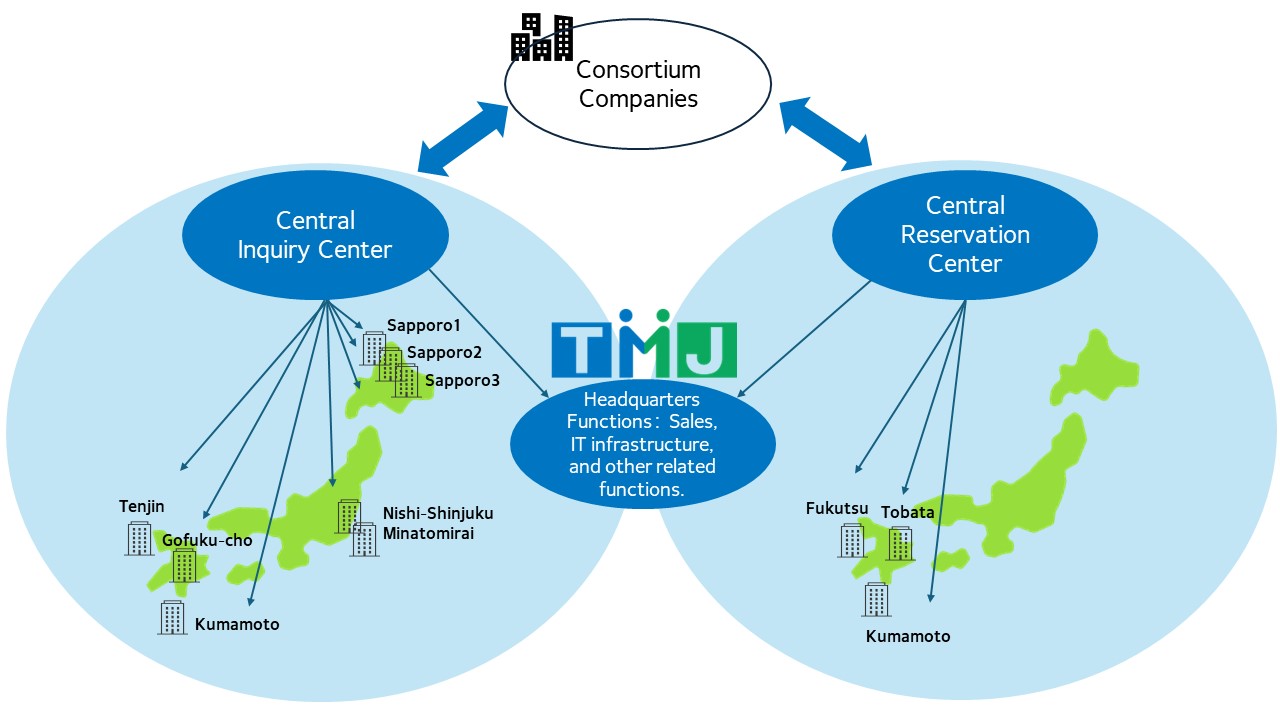Case studies
09.17 2024
Ministry of Economy, Trade and Industry
Government
Rapid deployment of 1,500 call center operators to handle +1 million inquiries for the Japanese government’s business subsidy program during COVID-19

In response to the economic challenges posed by the COVID-19 pandemic, the Japanese government launched a massive initiative to provide rent subsidies to businesses affected by the prolonged state of emergency declared in May 2020.
The Ministry of Economy, Trade and Industry (METI) needed to distribute approximately ¥900 billion in rent subsidies to over 1.08 million small and medium-sized enterprises (SMEs) and sole proprietors.
To execute this complex and time-sensitive project, METI partnered with a consortium of seven private companies. TMJ Corporation, as a key member of this consortium, played a crucial role in managing the application process, handling inquiries, and ensuring the seamless delivery of subsidies.
The Challenge
METI and the consortium faced several significant challenges in implementing this large-scale subsidy program:
- Scale: Managing applications and inquiries from over 1 million businesses.
- Time Sensitivity: Rapid deployment was required to relieve struggling businesses immediately.
- Complexity: Coordinating the activities between multiple private companies in the consortium.
- Variable Workload: Fluctuating inquiry and application volumes due to media coverage and advertising.
- Fraud Prevention: Implementing measures to detect and prevent fraudulent applications.
- COVID-19 Restrictions: Ensuring safe working conditions for staff during a pandemic.
The project's scale and urgency, combined with the need for accuracy and fraud prevention, created a unique set of challenges that required innovative solutions and seamless coordination among all parties involved.
The Solution
TMJ, as a vital member of the consortium, developed and implemented a comprehensive solution to address the challenges of the rent subsidy program:
1. Rapid Scaling of Operations:
TMJ quickly scaled up its operations by hiring and training approximately 1,500 new operators to handle the surge in inquiries and applications. This rapid expansion was crucial in managing the high volume of interactions from businesses seeking support.
2. Centralized Management System:
TMJ implemented a centralized system to effectively coordinate multiple locations and address a wide range of issues. This allowed for efficient management of the project's evolving nature from the initial application phase through its completion.

3. Advanced IT Tools for Real-Time Communication:
TMJ employed cutting-edge IT tools, including business management software, to facilitate real-time data sharing between the call center and all operational departments. This enabled timely and tailored support to SMEs and sole proprietors.
4. Comprehensive Knowledge Management:
TMJ focused on coordinating and sharing information about requirement additions and operational changes. They developed a robust system for case sharing, FAQ updates, and knowledge system synchronization to ensure all operators had access to the most current information.
5. Quality Enhancement Initiatives:
To maintain high service standards, TMJ implemented several quality enhancement measures:
- Reducing incorrect answers through regular tests and coaching
- Fostering a numerical mindset by setting goals in one-on-one meetings
- Horizontally deploying successful initiatives from high-productivity sites
6. Real-Time Operational Monitoring:
TMJ established a system for daily monitoring of operational fulfillment across all sites. This allowed for quick responses to challenges such as staff shortages during severe weather events or at partner companies.

7. Enhanced Training Program:
To ensure the success of the newly hired operators, TMJ made several improvements to its training program:
- Reduced class sizes by more than half to provide more personalized attention
- Revised curriculum to expand both classroom learning and on-the-job training
- Improved visual learning experience with larger projection screens
8. Supportive Onboarding Process:
TMJ implemented additional measures to support new operators:
- Grouped new hires during classroom training and allocated them dedicated seats in the call center
- Assigned dedicated mentors to each new operator on their first day
- Provided expanded reference materials to support operators during customer interactions
"The partnership with TMJ was instrumental in the successful implementation of this critical support program for Japanese businesses. Their ability to rapidly scale operations while maintaining high-quality service was crucial in delivering timely assistance to those in need."
- Representative from the Ministry of Economy, Trade and Industry
Results
The collaboration between METI, TMJ, and the other consortium members delivered impressive results in a short time.
Results achieved by TMJ:
- High-Volume Inquiry Handling: TMJ successfully managed over 1 million inquiries related to the subsidy program.
- Rapid Deployment: The program was implemented quickly, providing timely relief to businesses affected by the pandemic.
- Safe Working Environment: TMJ maintained a safe working environment for its employees throughout the project, with no significant COVID-19 outbreaks reported.
Results achieved by TMJ and the consortium:
- Successful Distribution: Approximately ¥900 billion in rent subsidies were distributed to over 1.08 million businesses, providing significant relief and reassurance to the affected businesses.
- Efficient Processing: Despite the high volume of applications, the consortium was able to process and verify applications efficiently, instilling confidence in the project's management.
- Fraud Prevention: The systems the consortium implemented successfully detected and prevented fraudulent applications.
- Positive Public Reception: The program received positive feedback from beneficiaries, with many expressing gratitude on social media, a testament to the initiative's positive impact on society.
The success of this project demonstrated TMJ's ability to rapidly scale operations, implement effective management systems, and deliver high-quality service in a challenging and time-sensitive environment. The company's focus on employee training, support, and safety contributed significantly to the initiative's overall success.
"Our core values of honesty, trust, acknowledgement, co-creation, and rising to meet challenges were the foundation of our approach to this project. By building a high-performing team and fostering a positive work environment, we delivered exceptional support to businesses in need while also creating a sense of accomplishment among our operators."
- TMJ Project Lead

